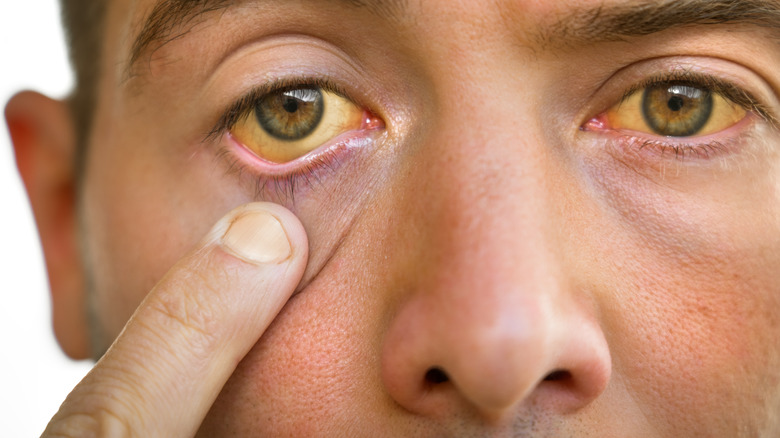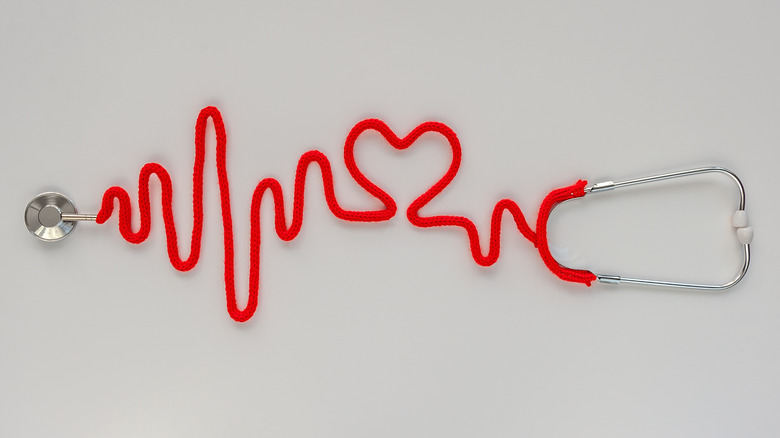You're Not Getting Enough Vitamin B12 If This Happens To You
With so many different sources of B12 available, it might seem almost impossible to have a deficiency in this vitamin. As Verywell Health notes, B12 or cobalamin is in everything from eggs, tuna, and beef to chicken, milk, and yogurt. And, yes, it's also found in supplement form. Nevertheless, someone can still develop a B12 deficiency.
The first major snag when it comes to not getting enough B12 is the fact that our bodies only absorb so much of this vitamin at a time regardless of how much we take in via food or supplements. But that's not all. As we age, we tend to take in lower amounts of B12 again regardless of how much we consume (via WebMD). Plus, surgeries like gastric bypass, some medications (like proton pump inhibitors for heartburn), and conditions like lupus and Crohn's disease can all increase the odds of low B12 levels.
Not surprisingly, if your body doesn't have enough B12, you can experience a number of unpleasant symptoms, including those connected to a form of anemia (via Johns Hopkins Medicine). This is because your body needs to produce red blood cells in order to transport oxygen to all your systems. Without the right amount of B12, however, your body will not only make few red blood cells but also misshapen, weaker ones.
Swollen tongue
According to Medical News Today, low B12 can cause one's tongue to become swollen and painful to the point that everyday activities like eating, swallowing, and talking become difficult to nearly impossible. Known as glossitis, this condition can also make the tongue unnaturally smooth, change color, and even itchy. And as a report in the Canadian Medical Association Journal revealed, one woman in her early 60s felt like her tongue was burning until she was given an injection of B12. Her tongue returned to normal three days after receiving treatment.
However, B12 deficiency is not the only possible cause of glossitis — not by a long shot. As Medical News Today explains, low iron can also affect the tongue, as well as ailments like celiac disease. If you believe you have glossitis, you should speak with your health care professional right away. If they suspect vitamin B12 deficiency is the underlying cause, they can administer a blood test and advise you on the best way to increase your levels (via MedlinePlus).
Jaundice
In a scary movie, yellow eyes can signal that a particular character is dangerous. Just ask those who tangled with Pennywise in the movie "It." But in real life having a yellow sclera (aka the white part of the eye) can be a warning sign that your B12 is very low, and you might have a form of anemia (via Healthline).
Known as jaundice, this ailment not only affects one's eyes but also can change the appearance of the skin, so it appears paler with "a slight yellow tinge," per Healthline. The reason behind this is B12 is crucial for the body to make the right amount of healthy, red blood cells. Without enough B12, however, the body can develop megaloblastic anemia where it's creating smaller amounts of weaker red blood cells that are abnormally large in size. The results are your body is working with few blood cells that it cannot circulate as easily, leaving all parts of your body, including your skin and eyes, not getting enough oxygen.
In addition, because these red blood cells are weaker, they break apart and are changed in the liver into a substance called bilirubin (via Healthline). Now, even healthy red blood cells eventually become bilirubin. But when large amounts of red blood cells break down, unusually high levels of bilirubin form in the body. And if you guessed that excess bilirubin is why one's eyes and skin can change in color because of jaundice, you'd be right.
Changes in mental state
Not having enough B12 can take a toll on a person's mental health and sometimes quite severely, according to Mount Sinai. Before we dive into the most serious mental impacts of B12, let's first talk about the more subtle ones that can be easy to miss.
According to Mount Sinai, a person with B12 deficiency can have difficulty concentrating and experience confusion. The reason behind both of these issues? Low levels of B12 can cause nerve damage. And this is where we come to the more severe possible side effects if your body isn't taking in the B12 it needs.
Without enough B12, you might experience a condition called psychosis where you could become delusional (via Mount Sinai). Specifically, your thoughts might race as if your mind is a TV constantly changing to different channels that have nothing in common. You also might experience hallucinations like hearing music when there is no music playing or feeling like your organs are moving around inside your body (via Mount Sinai). Whether or not low B12 is the cause, if you or someone you know is hallucinating or delusional, seek medical help right away.
Pins and needles sensation
The phrase "pins and needles" is used quite a bit in certain everyday situations. For example, if you're anxiously waiting for an important phone call, you might say you're "on pins and needles." And if your foot falls asleep, you could describe the sensation as prickly and similar to "pins and needles." But this common descriptive phrase takes on a more serious meaning if you're describing a symptom of B12 deficiency.
As Medical News Today explains, B12 is important for your nervous system. Why? Because without it, your body couldn't properly make the shielding covering on your nerves called myelin. And if you guessed that without enough myelin, your nerves could become injured and weakened, you'd be right. In fact, you can experience nerve damage, especially in your feet and hands. Okay, but is a little tingling really something to worry about? Wouldn't that be more annoying than troubling?
Unfortunately, ignoring this seemingly minor B12 symptom can lead to more serious health concerns. While you might have only minor pins and needles today, that nerve damage can graduate to numbness that can cause movement issues and problems with one's reflexes (via Medical News Today). So don't be embarrassed to bring up what you're feeling in your feet or hands to your health care professional. Nipping this symptom in the bud today could save you from bigger medical issues down the road.
Feeling sluggish
Hands down, one of the sneakiest symptoms of B12 deficiency is feeling overly tired. After all, there are a number of things in life that can zap one's energy. Stress at work, allergies, a poor night's sleep, and even just opting for a not-so-healthy snack all may leave one a bit off and dragging themselves through the day. But just because this symptom is easy to miss doesn't mean you should ignore it.
As registered dietitian Lisa Cimperman told Prevention, fatigue isn't just a signal that your body might need more B12, it's also "one of the first signs of B12 deficiency." Remember, you need healthy red blood cells to circulate oxygen throughout your body. But without enough B12, your body cannot make enough healthy red blood cells. This means that every part of you is not getting the oxygen it needs, leaving you feeling sluggish. And excessive yawning and feeling like you need a nap is only the tip of the iceberg.
As Prevention noted, the domino effect of low B12 and not enough oxygen circulating throughout the body can take a toll on your muscles. Simply put, if your muscles aren't getting enough oxygen, tasks like carrying a basket of laundry can feel more like carrying a basket of bricks. However, muscle issues can be a symptom of many different ailments, so check a health care professional before adding more B12 to your diet or vitamin regime.
Feeling depressed
Let's state something upfront: The scientific jury is still out as to exactly how vitamin B12 and mood are connected (via Healthline). With that said, there does appear to be a link between the two since depression can be a symptom of B12 deficiency. So, does that make B12 an effective treatment for depression? Unfortunately, the answer is not always.
Even though there are still questions about B12's impact on mood, we do know that this vitamin is necessary for your body to create and make use of a chemical in your brain called serotonin (via Healthline). Since low serotonin can affect one's mood, it's possible that low B12 means your body is unable to produce enough serotonin, which might cause depression. In addition, there are studies that support treating depression in part by increasing one's level of B12. However, there is still one more important factor to consider.
Although depression can be a symptom of B12 deficiency, a person can experience depression for reasons that have nothing to do with how much B12 is in their body (via Healthline). So, yes, taking B12 might help with depression but only if low B12 is the cause. Regardless, if you or someone in your life is experiencing depression, seek medical assistance right away. Remember, depression is a serious condition that should never be ignored.
Bone fractures
Despite how much we've learned about the human body, there are still aspects of it that we just don't fully understand. Case in point, the way not having enough B12 impacts bone density. However, just because we cannot connect all the dots doesn't mean we should ignore emerging patterns from scientific research.
Studies have found connections between low B12 and osteoporosis in women (via ScienceDaily). This condition can make bones more fragile and even porous in nature. In addition, the Agricultural Research Service has found evidence that B12 deficiency and osteoporosis in men might also go hand in hand. And, unfortunately, unlike other signs of low levels of B12, bone issues usually don't have any warning signs. What's more likely to occur is a person will one day break or fracture a bone, and the injury might happen during an everyday occurrence like tripping and falling on the sidewalk.
But there is good news. Dietary changes like eating more fish can help to up B12 intake and keep bones healthy and strong (via Science Daily). However, before you make any changes to your diet, make sure to speak with either your health care professional or a nutritionist. Remember, everyone is different and what might be a good meal plan for one person could be an unhealthy one for someone else with different medical needs.
Seizures
Since not having enough vitamin B12 can affect the brain, it's not surprising that seizures are a possible symptom of B12 deficiency (via The Nutrition Source). So there's no confusion, a seizure specifically occurs when the brain sends out abnormal electrical impulses. As a result, the person could begin convulsing and might lose consciousness. Understandably, this is a potentially dangerous and life-altering condition, and addressing B12 deficiency could be the first step to getting a handle on it.
According to a report in Epilepsia, a man in his mid-70s had been having seizures three to five times a month over the course of three years. After being diagnosed and treated for epilepsy for a little over a year, the man's seizures hadn't lessened and he also started experiencing numbness in his feet and knees. After being admitted to a hospital, he was given hydroxocobalamin (a B12 treatment) weekly for a month. From the first dose, his seizures stopped, and after six more months of B12-based treatment, the numbness had lessened to the point he was walking normally.
So, why wasn't B12 immediately administered to this patient? Well, part of the reason might have been that he was diagnosed as having only mild normocytic anemia. And since seizures are a common symptom of epilepsy, it's possible those treating him focused on the stronger, more likely ailment.
Vision problems
We need to make one thing clear right up front. Losing your vision from B12 deficiency is not a common occurrence (via Bailey Eye Care). With that said, it can happen even if your diet includes sufficient amounts of B12. And ignoring vision changes can lead to permanently affected eyesight.
To fully understand why someone could have vision loss from low levels of B12 (a condition called nutritional optic neuropathy), we need to talk about the optic nerve, which connects our eyes to our brains. No matter how well the rest of your eye functions, if your optic nerve is damaged, then the images your eye takes in can become distorted or not reach the brain at all (via Bailey Eye Care). And here's the scary part: Nerve damage can be permanent. So, does that mean if you have B12 deficiency, you just go blind one day? Possibly, but the changes in your vision could be more subtle than that.
As Bailey Eye Care explained, if your optic nerve is damaged, you may notice colors aren't as crisp. Others may find their eyesight goes back and forth between being normal and weaker. And for still others, these and other changes may only happen in one eye. If you suspect you have nutritional optic neuropathy, you should speak with your primary care provider as well as your eye doctor.
Overactive or underactive bladder
Nerve damage from low levels of B12 can have a number of effects on the body, and one that can feel embarrassing to talk about is neurogenic bladder (via Urology Associates). Plus, this B12 deficiency symptom can be especially difficult to recognize as two people who both have low B12 could have neurogenic bladder with completely opposite problems in the bathroom.
As Urology Associates revealed, not having enough B12 can cause underactive bladder (UAB) or overactive bladder (OAB). If someone has UAB, they might not even realize that they need to urinate, which can cause pain. On the other hand, someone with OAB could need to run to the bathroom at least eight times every day. To make matters worse, a person can have both UAB and OAB, and either of these conditions can cause urinary tract infections, skin sores, and kidney issues.
Although UAB and OAB can have different symptoms, there are some common ones you should watch for especially if you suspect nerve damage caused by B12 deficiency (via Urology Associates). These include difficulty urinating and pain during urination. Neurogenic bladder can lead to accidents, making it one of the more difficult low B12 symptoms to discuss. However, if you notice ongoing significant changes in your bathroom routine, you should make an appointment with your health care professional.
Sleeping issues
So many things can disrupt a good night's sleep that it can be difficult to pinpoint an exact cause. Of course, obvious ones, like having too much caffeine too close to bedtime, are easy to address, but the possibility that you're missing out on your Z's because of B12 deficiency is a bit more complicated.
As Psychology Today explains, research has been mixed on B12's impact on sleep. While some data supports a connection between not having enough of this vitamin and a disrupted sleep cycle, others show elevated amounts of B12 can also throw off a restful night's sleep. Although more research is needed, it would seem at this time that B12 is like the porridge Goldilocks ate: It needs to be "just right" in terms of its levels to potentially have a positive impact on the quality of your sleep.
And there's still one more important point to consider when it comes to B12 and sleep. Since your body needs B12 to create serotonin, low levels of B12 could also mean less serotonin and a greater risk of developing depression (via Healthline). And since depression can throw off your circadian rhythm (aka your body's process that regulates when you sleep and when you're awake), this might be another way that B12 can throw off your sleep, per Psychology Today. Fortunately, a blood test can determine if your B12 levels are either too low or too high (via Medline Plus).
Faster or irregular heartbeat
If an animated character's heart suddenly starts pounding out of their chest, they're probably either lovestruck or frightened. For us non-animated types, however, changes in heart rate can be a signal of low B12, which, if ignored, can escalate to serious heart-related health issues.
As registered dietitian Maggie Moon told Health, an accelerated heart rate and not enough B12 can be connected. Why? Well, remember, your body needs B12 to make red blood cells (via Johns Hopkins Medicine). Without enough B12, you can develop a form of anemia where you're not only producing less red blood cells, but also larger, weaker ones. As a result, your heart has to work harder, leading to not only a faster heart rate but also sometimes an irregular one (a condition known as arrhythmia), according to the Mayo Clinic. And this is where one's health can really take a turn for the worse.
As the Mayo Clinic detailed, you could wind up with an enlarged heart if you have anemia. And this can lead to potentially life-threatening health problems like issues with your heart's values (called a heart murmur), blood clots, cardiac arrest, and heart failure (via Mayo Clinic). Fortunately, there are a number of products on the market that can help you monitor your pulse from home. However, don't just rely on these devices. If you suspect issues with your heart, get yourself medical help right away.
Dizziness and vertigo
Imagine you're sitting around with a group of friends, watching television. You're having a nice time and decide to get something to drink. But as you stand up, you suddenly have a dizzy spell and flop back down onto the couch. For a moment, you sit there confused. How could you go from feeling fine to feeling like you just got off a looping rollercoaster?
As Winchester Hospital explained, not only is becoming lightheaded when standing up a symptom of low B12, it's one of the most common signs you have this particular vitamin deficiency. In fact, Dr. Gregory Whitman, an ear and brain specialist with the Massachusetts Eye and Ear Balance and Vestibular Center at Braintree Rehabilitation Hospital in Massachusetts, told Everyday Health, "Vitamin B12 deficiency is easy to detect and treat, but is an often overlooked cause of dizziness." He further explained that B12 deficiency can mean less blood is circulating throughout your body, including to your brain, which might be why you're feeling lightheaded and unsteady.
Besides dizziness, reduced blood flow caused by low levels of B12 can also lead to vertigo. And although vertigo and dizziness are similar, vertigo can also cause nausea and vomiting. The suddenness of both of these conditions can be concerning, however, as Dr. Whitman noted, a blood test can determine if low B12 is the culprit.
Tinnitus
Anyone who has ever gone to a rock concert has had a brush with tinnitus (aka persistent ringing in the ears). But for someone with B12 deficiency, that annoying noise can actually interfere with the quality of their life (via MedicineNet).
As MedicineNet explains, tinnitus is not just limited to a ringing sound. It can also be similar to constant chirping, buzzing, hissing, and even screeching in one's ears. Since low levels of B12 can negatively affect the body's nerves, this could account for why some people with B12 deficiency develop tinnitus. And to make matters worse, evidence suggests that not enough B12 might lead to depression, which has been known to magnify tinnitus (via MedicineNet).
Sadly, depending on the severity of the case, tinnitus can cause a host of health problems ranging from anxiety and sleep issues to difficulty with focus and memory (via Mayo Clinic). It can also cause headaches, exhaustion, and irritability. Fortunately, if B12 deficiency is the underlying cause, then a health care professional should be able to treat this form of tinnitus (via MedicineNet). In fact, they might recommend B12 supplements in the long or short term. And one final note regarding tinnitus: If you are regularly exposed to loud noises, you might want to consider investing in a good pair of earplugs to help protect your hearing.















